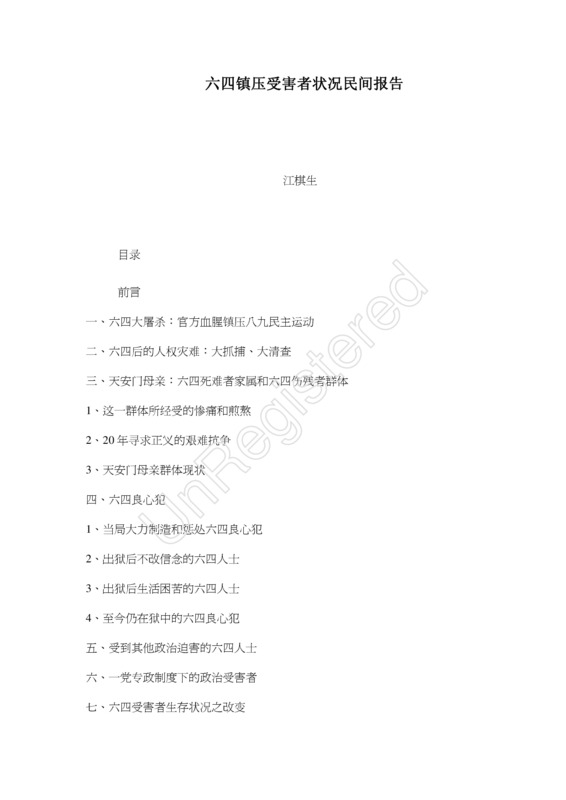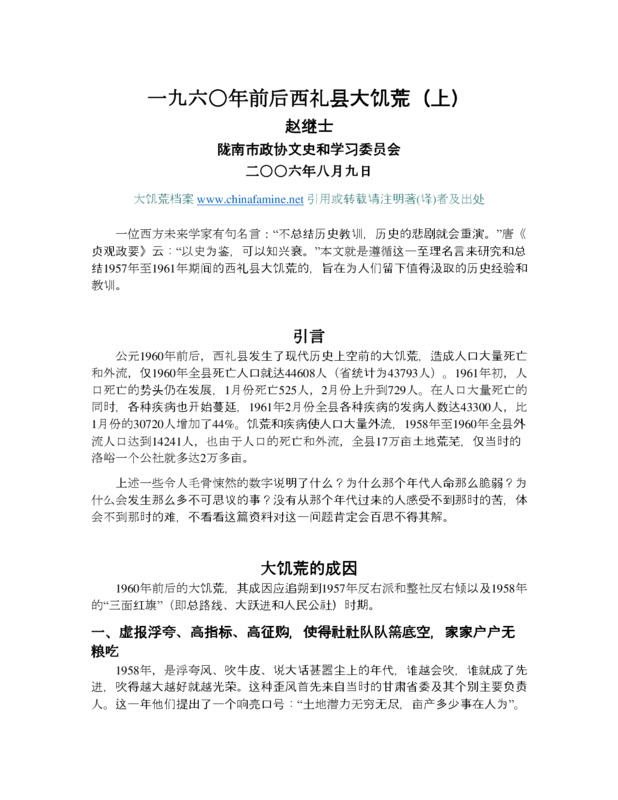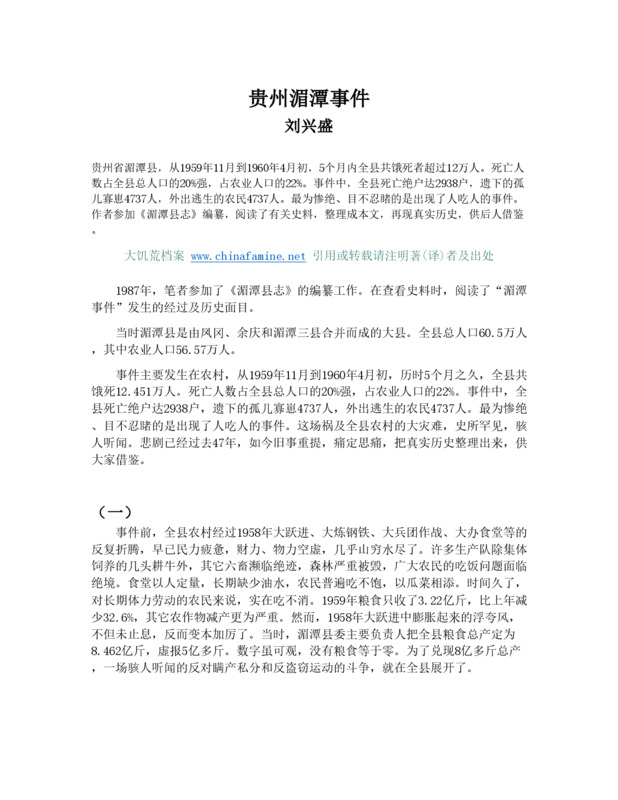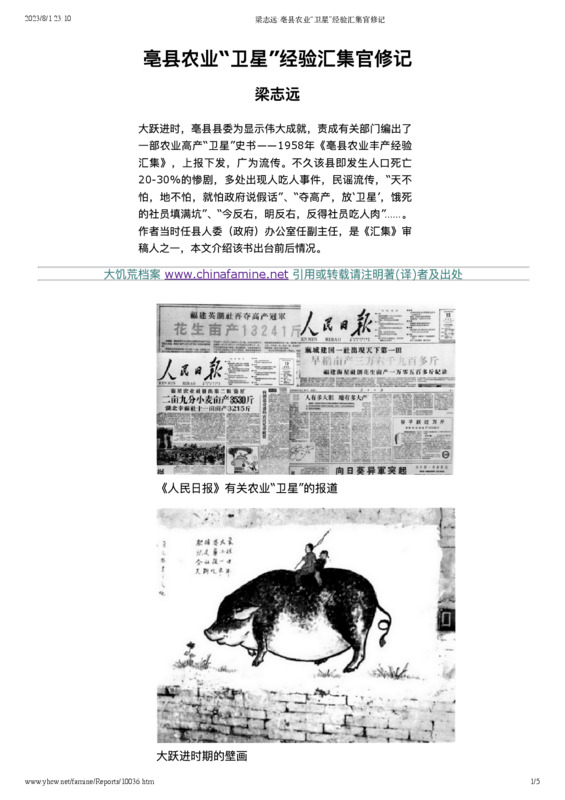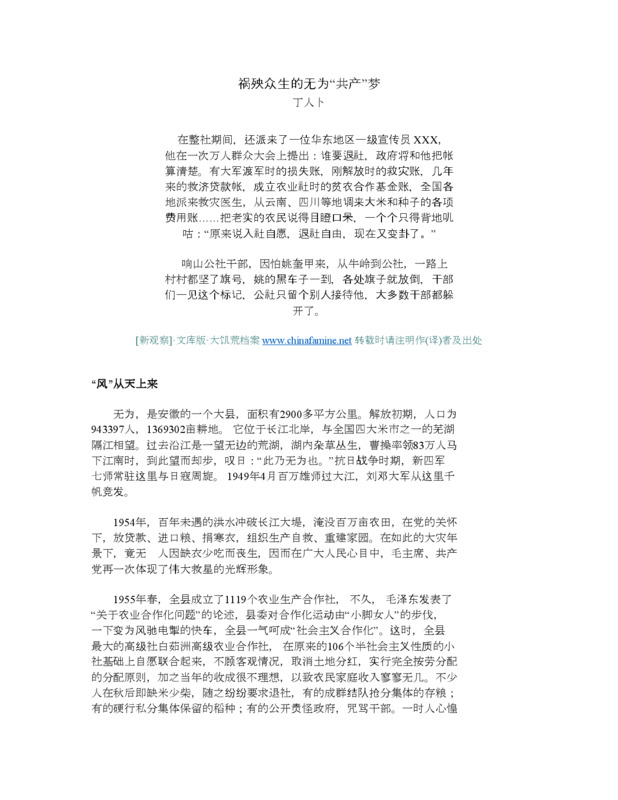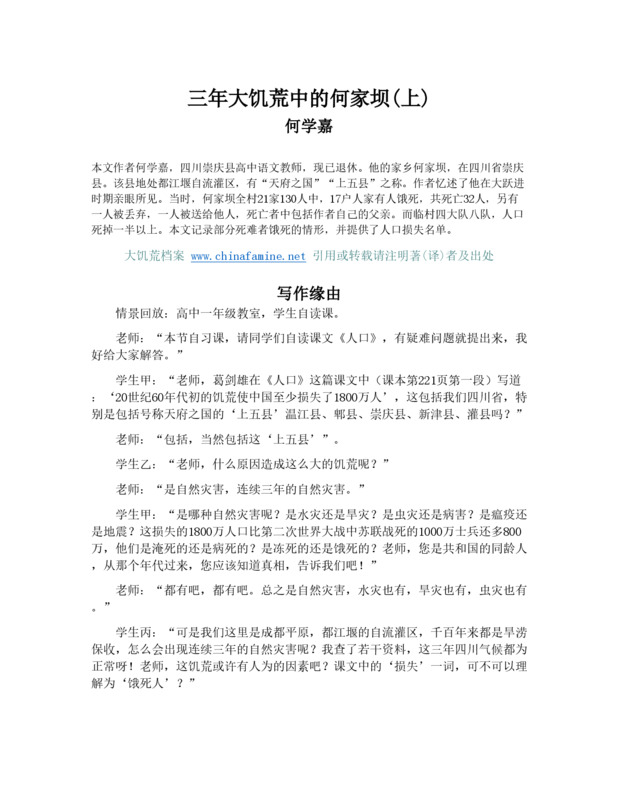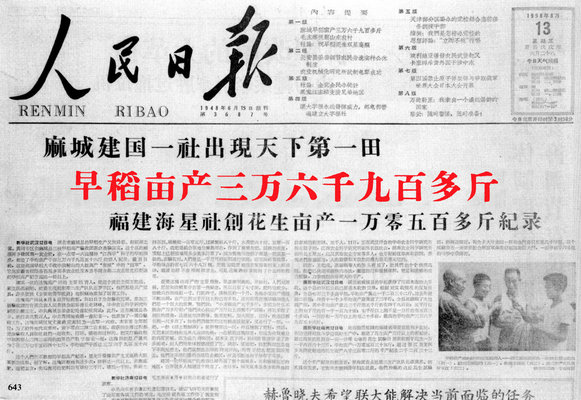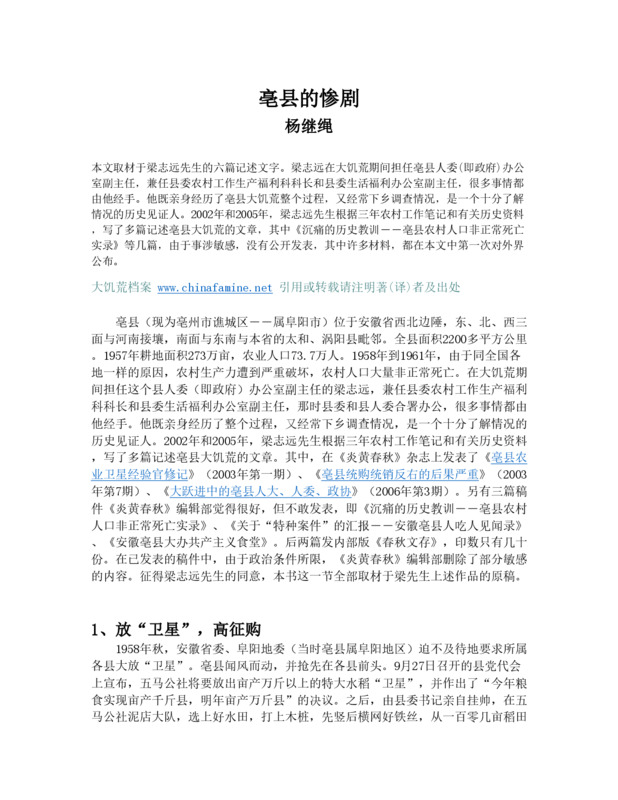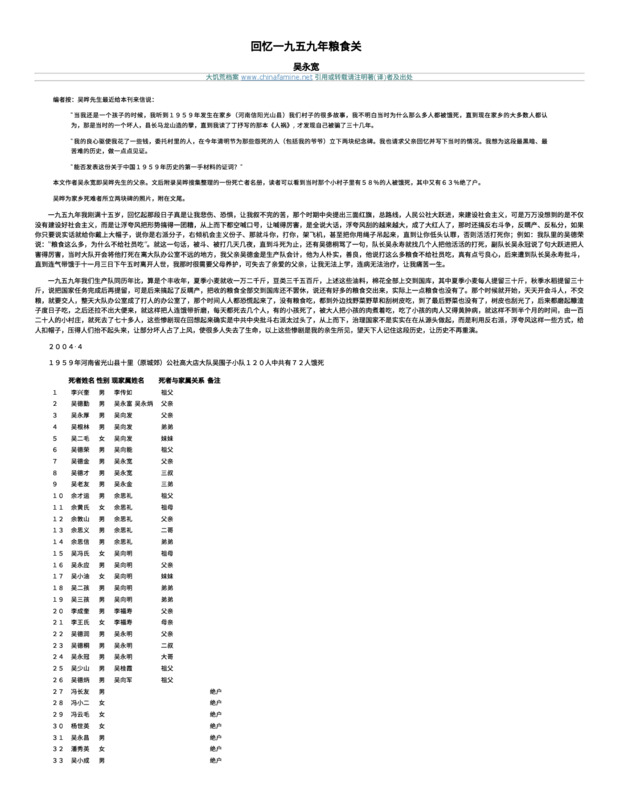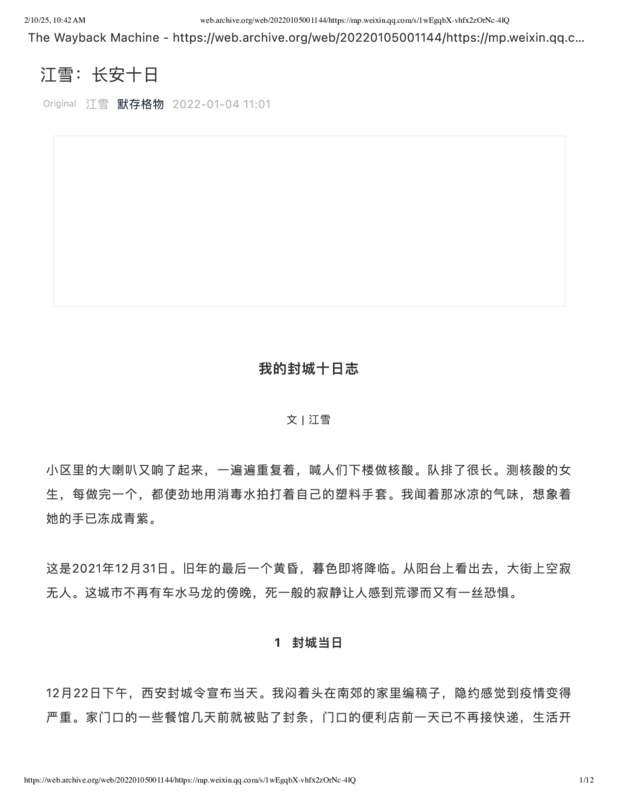Explore the collection
Showing 12 items in the collection
12 items
Article
Famine and Village: Who Starved Them to Death?
The author of this article, Chen Feng, was born in 1962. His hometown is Huang Sichong, Sanjia Brigade, Bainong Commune, Feidong County, Anhui Province. According to his records, in the winter of 1959 to the spring of 1960 during the Great Famine, his grandfather, grandmother, grandfather, grandmother's relatives and relatives, and countless members of his extended family and village, 57 people died of starvation.
Article
Jiang Qisheng: Civilian Report on the Situation of June 4 Victims in China
The Tiananmen Square massacre on June 4, 1989 and the subsequent mass arrests and purges created tens of thousands of June Fourth victims. Among them were June Fourth victims who fell into a pool of blood, the June Fourth disabled who were shot, the families of the June Fourth victims and the severely disabled, the June Fourth prisoners of conscience who were sentenced to imprisonment or re-education-through-labor, and the June Fourth victims who were subjected to other political persecution. On the occasion of the 20th anniversary of June Fourth, as part of Chinese civil society's efforts to recover the historical truth and rebuild historical memory, this report gives a basic description of the suffering of the June Fourth victims and their arduous journey over the past 20 years. It also analyzes the systemic factors that have contributed to the victims' suffering and proposes corresponding recommendations on how to change their living conditions.
Article
My Life: China's Direction
When the Cultural Revolution broke out, Yang Xiaokai was a senior high school student at No. 1 Middle School in Changsha. On January 12, 1968, he published an article entitled "Where is China Going?" which systematically put forward the ideas of the "ultra-leftist" Red Guards, criticized the privileged bureaucratic class in China, and advocated for the establishment of a Chinese People's Commune based on the principles of the Paris Commune. Yang Xiaokai recalled that his parents were beaten because they sympathized with Liu Shaoqi's and Peng Dehuai's views, and that he was discriminated against at school and could not join the Red Guards. As a result, he joined the rebel faction to oppose the theory of descent. Yang Xiaokai was later sentenced to 10 years' imprisonment for this article. Yang Xiaokai died in 2004. This article is a retrospective of his life.
Article
Special Collections |Famine and Counties (7): The Great Famine in Xili County around 1960
Around 1960, Xili County experienced a famine unprecedented in modern history, resulting in massive population deaths and an exodus, with 44,608 deaths in the county in 1960 alone (43,793 according to provincial statistics). In early 1961, the momentum of population deaths continued to develop, with 525 deaths in January, rising to 729 in February. Along with the massive population deaths, various diseases began to spread. Famine and disease caused a massive exodus of population. From 1958 to 1960 the exodus of population from the county reached 14,241 people. Also due to the death and exodus of population, 170,000 acres of land in the county were left barren, only one commune of Luoyu at that time had more than 20,000 acres.
Article
Special Collections |Famine and County (2): Guizhou Meitan Incident
In Meitan County, Guizhou Province, from November 1959 to early April 1960, more than 120,000 people starved to death in five months. The deaths accounted for more than 20 percent of the county's total population and 22 percent of the agricultural population. During the incident, 2,938 families died in the county, 4,737 orphans and widows were left behind, and 4,737 peasants went out to escape. The most tragic and horrible thing to witness was incidents of cannibalism. The author participated in the compilation of "Meitan County Records," read the relevant historical materials, and organized this article to reproduce the real history for future generations to learn from.
Article
Special Collections |Famine and the county (5): Haoxian agricultural "satellite" experience collection official repair collection
The former Bo County (now Qiaocheng District, Bozhou City) in Anhui Province is located in the plains of northwest Anhui. During the Great Leap Forward in 1958, under the slogan of "how bold people are, how productive the land is," in Bo County, like everywhere else, generally produced agricultural high-yield "satellites." Afterwards, to show the great achievement, the county party committee instructed the relevant departments to compile a high agricultural yield "satellite" history book - 1958, <i>Bo County Agricultural Yield Experience Collection</i>, that was reported to the press and widely circulated. At that time, I served as deputy director of the county people's committee (government) office and was appointed by the county party committee as one of the reviewers. Now I would like to introduce the incredible circumstances for future generations with the the introduction of the history book *Collection*.
Article
Special collections |Famine and the County (6): The "Communist" Dream of Doing Nothing that Wreaks Havoc on the People
During the period of reorganization of the commune, a first-class propagandist from East China was sent to the commune. At a mass meeting of 10,000 people, he proposed that whoever wanted to withdraw from the society, the government would settle accounts with him. There was an account of the losses incurred when the army crossed the border; an account of the disaster relief during the past few years, an account of the poor-peasant cooperative fund when the Agricultural Society was established; and the accounts of the various expenses incurred in sending disaster relief doctors from all over the country and transferring rice and seeds from Yunnan and Sichuan ...... The honest peasants were dumbfounded. Each one privately complained: "The original said that membership was voluntary and withdrawal was free, but now they have changed their minds."
Article
Special Collections |Famine and Village (1) Hejiaba in the Three-Year Famine
At the time of its writing, the author of this article, He Xuejia, was a retired high school language teacher in Chongqing County, Sichuan Province. His hometown, Hejiaba, is in Chongqing County, Sichuan Province. The county is located in the Dujiangyan Artesian Irrigation District and is known as the "Land of Heavenly Capital" and the "Upper Five Counties." The author recalls what he witnessed during the Great Leap Forward. At that time, Hejiaba village had 21 families of 130 people. 17 families starved to death, a total of 32 deaths, another person was abandoned, one was given to others, the deaths include the author's own father. As for the four major teams and eight teams in the adjacent village, more than half of the population died. This paper documents some of the deaths from starvation and provides a list of population losses.
Article
Special Collections|Famine and Village (2) The People's Commune Canteen in Zhoujiawan
"In the second month of the 1961 lunar calendar, the communal canteen was disbanded. The houses and pigsties of the members were compensated and returned. The land was set aside, and the rations were supplied. So we gradually got through the difficult times. Some said that if the communal canteens had been organized for a few more years, I wonder how many more people would have died. "This is the personal experience and oral account of a farmer in Yingshan County, Sichuan Province.
Article
Special Feature|Famine and County (3): Hao County's Tragedy
This article is taken from six accounts by Mr. Liang Zhiyuan. Mr. Liang Zhiyuan was the deputy director of the Bo County People's Committee (i.e., the government) office during the Great Famine. He also served as the head of the Production and Welfare Section of the County Party Committee's Rural Work Department and the deputy director of the County Party Committee's Living and Welfare Office, where he was responsible for a lot of things. In 2002 and 2005, based on three years of rural work notes and relevant historical information, Mr. Liang Zhiyuan wrote a number of articles describing the Bo County famine, including "A Painful Lesson in History - The Unnatural Deaths of the Rural Population in Bo County." and several other articles. Due to the sensitivity of the matter, these have not been published publicly, and many of these materials are released to the outside world for the first time in this article.
Article
Specials Collections| Famine and Village (6) Memories of the 1959 Grain Shutdown
In 1959, out of 120 people in Wu Weizi Squad of Gao Dadian Brigade, Shili Commune, Guangshan County, Henan Province, 72 people died of starvation. Author Wu Yongkuan witnessed the deaths of his father and his fellow villagers. His son, Wu Ye, collected and organized a list of the dead, and readers can see that, at that time, 58% of the people in that small village died of starvation, and 63% of families died off with no descendants.
Article
Ten Days in Xi'an
Published on January, 2022, “Ten Days in Xi’an” is a log of Chinese independent journalist Jiang Xue’s daily experiences under COVID-19 lockdown, posted onto WeChat’s social media platform. In this piece, Jiang depicts the crises and challenges faced by Xi’an residents under lockdown, such as the lack of access to medical resources. “Ten Days in Xi’an” was viewed by millions of Chinese users on social media platforms when it was posted, and received comments and support from thousands of Chinese citizens. It was later translated into English by Andréa Worden and published on Probe International virtually. You can find the translated article in the PDF below, or through this link: <https://journal.probeinternational.org/2022/08/22/ten-days-in-xian/>.

